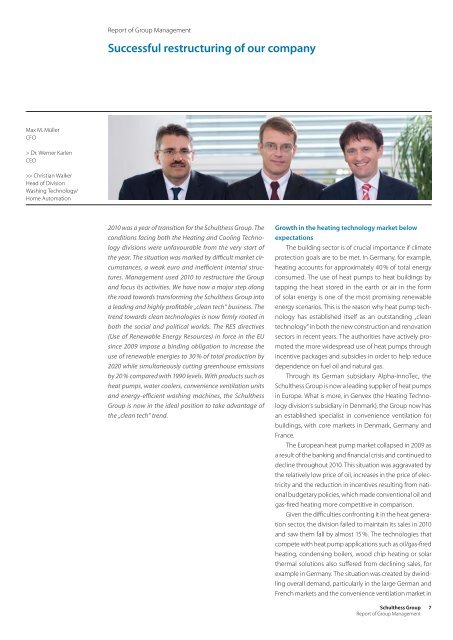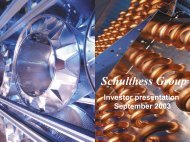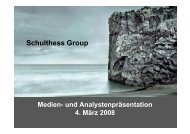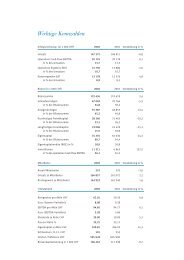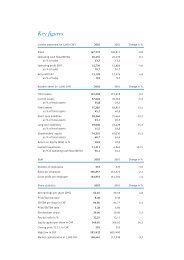Annual Report 2010 (PDF) - Schulthess Group
Annual Report 2010 (PDF) - Schulthess Group
Annual Report 2010 (PDF) - Schulthess Group
You also want an ePaper? Increase the reach of your titles
YUMPU automatically turns print PDFs into web optimized ePapers that Google loves.
Max M. Müller<br />
CFO<br />
> Dr. Werner Karlen<br />
CEO<br />
>> Christian Walker<br />
Head of Division<br />
Washing Technology/<br />
Home Automation<br />
<strong>Report</strong> of <strong>Group</strong> Management<br />
Successful restructuring of our company<br />
<strong>2010</strong> was a year of transition for the <strong>Schulthess</strong> <strong>Group</strong>. The<br />
conditions facing both the Heating and Cooling Technology<br />
divisions were unfavourable from the very start of<br />
the year. The situation was marked by difficult market circumstances,<br />
a weak euro and inefficient internal structures.<br />
Management used <strong>2010</strong> to restructure the <strong>Group</strong><br />
and focus its activities. We have now a major step along<br />
the road towards transforming the <strong>Schulthess</strong> <strong>Group</strong> into<br />
a leading and highly profitable „clean tech“ business. The<br />
trend towards clean technologies is now firmly rooted in<br />
both the social and political worlds. The RES directives<br />
(Use of Renewable Energy Resources) in force in the EU<br />
since 2009 impose a binding obligation to increase the<br />
use of renewable energies to 30 % of total production by<br />
2020 while simultaneously cutting greenhouse emissions<br />
by 20 % compared with 1990 levels. With products such as<br />
heat pumps, water coolers, convenience ventilation units<br />
and energy-efficient washing machines, the <strong>Schulthess</strong><br />
<strong>Group</strong> is now in the ideal position to take advantage of<br />
the „clean tech“ trend.<br />
Growth in the heating technology market below<br />
expectations<br />
The building sector is of crucial importance if climate<br />
protection goals are to be met. In Germany, for example,<br />
heating accounts for approximately 40 % of total energy<br />
consumed. The use of heat pumps to heat buildings by<br />
tapping the heat stored in the earth or air in the form<br />
of solar energy is one of the most promising renewable<br />
energy scenarios. This is the reason why heat pump technology<br />
has established itself as an outstanding „clean<br />
technology“ in both the new construction and renovation<br />
sectors in recent years. The authorities have actively promoted<br />
the more widespread use of heat pumps through<br />
incentive packages and subsidies in order to help reduce<br />
dependence on fuel oil and natural gas.<br />
Through its German subsidiary Alpha-InnoTec, the<br />
<strong>Schulthess</strong> <strong>Group</strong> is now a leading supplier of heat pumps<br />
in Europe. What is more, in Genvex (the Heating Technology<br />
division‘s subsidiary in Denmark), the <strong>Group</strong> now has<br />
an established specialist in convenience ventilation for<br />
buildings, with core markets in Denmark, Germany and<br />
France.<br />
The European heat pump market collapsed in 2009 as<br />
a result of the banking and financial crisis and continued to<br />
decline throughout <strong>2010</strong>. This situation was aggravated by<br />
the relatively low price of oil, increases in the price of electricity<br />
and the reduction in incentives resulting from national<br />
budgetary policies, which made conventional oil and<br />
gas-fired heating more competitive in comparison.<br />
Given the difficulties confronting it in the heat generation<br />
sector, the division failed to maintain its sales in <strong>2010</strong><br />
and saw them fall by almost 15 %. The technologies that<br />
compete with heat pump applications such as oil/gas-fired<br />
heating, condensing boilers, wood chip heating or solar<br />
thermal solutions also suffered from declining sales, for<br />
example in Germany. The situation was created by dwindling<br />
overall demand, particularly in the large German and<br />
French markets and the convenience ventilation market in<br />
<strong>Schulthess</strong> <strong>Group</strong> 7<br />
<strong>Report</strong> of <strong>Group</strong> Management


